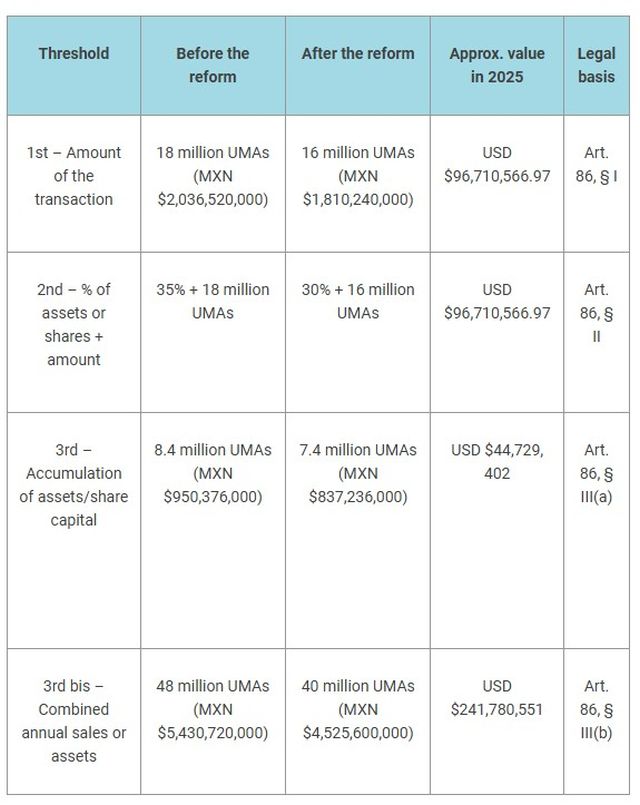- within Antitrust/Competition Law topic(s)
- within Antitrust/Competition Law topic(s)
- within Antitrust/Competition Law and Corporate/Commercial Law topic(s)
Reform of the Federal Economic Competition Law (LFCE, for its initials in Spanish) – Creation of the National Antitrust Commission (CNA, for its initials in Spanish).
- Overall Context
- Upon the constitutional reform of December 2024 on governmental organizational simplification, the Federal Economic Competition Commission (COFECE, for its initials in Spanish) is replaced by the CNA, a decentralized public agency under the Ministry of Economy, with technical, operational, and administrative autonomy. The CNA also assumes all the functions and authority of the Federal Telecommunications Institute (IFT, for initials in Spanish), with respect to economic competition matters.
- By virtue of the above the CNA shall be the authority responsible for continuing and resolving new and ongoing cases, and for enforcing the compliance measures and liabilities previously imposed on economic agents.
- In addition, thereto, on July 17, 2025, the Decree amending,
several provisions of the LFCE and the Federal Law on Parastatal
Entities became effective. This change responds to a legislative
assessment of the high market concentration in Mexico and its
negative impact on prices, innovation, and equitable access to
goods and services
- Key Amendments
- Reduction of thresholds for mandatory notification of concentrations (Art. 86 LFCE).
- Increase in fines and penalties, as well as new enforcement measures (Art. 127 LFCE).
- Extension of the deadlines for investigating unnotified concentrations: from 1 year to 3 years (Art. 94 LFCE).
- Recognition and certification of compliance programs as mitigating factors for penalties (Art. 139 LFCE).
- More efficient procedures: reduction of
procedural deadlines for investigations and authorizations (Art.
90, 127, and 131 LFCE).
- Comparative table – Thresholds for notification
of mergers(Art. 86 LFCE)

Note: The 2025 Unit of Measurement and Update (UMA, for its initials in Spanish) value is $113.14 MXN and the exchange rate used was $18.7178 MXN/USD (Official Gazette, July 17, 2025).
- Maximum fines and penalties
- The amendment to Article 127 of the LFCE increases the penalty caps, allowing fines of up to 15% of the economic agent's income for absolute monopolistic practices (§ IV) or for carrying out concentrations that exceed the thresholds without authorization when they have been previously objected to (§ VIII, second paragraph). The percentages for related practices, illegal concentrations, non-compliance with conditions, and other infringements are also adjusted, maintaining economic sanctions as a key tool to deter anti-competitive behavior.
- Recommendations for companies
- Review agreements and ongoing operations that may exceed the new thresholds.
- Implement or update certified compliance programs to obtain mitigating benefits.
- Avoid closing transactions without prior authorization when notification is mandatory.
- Follow the upcoming secondary guidelines issued by the CNA.
- Train key personnel on the new risks and processes applicable to the CNA.
These reforms reflect a shift toward more active and punitive regulation of anti-competitive conduct and concentrated market structures. Companies will need to adapt to an environment with greater oversight, new liabilities, and potential limits on expansion or business alliances.
The content of this article is intended to provide a general guide to the subject matter. Specialist advice should be sought about your specific circumstances.
[View Source]

